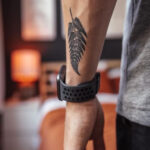Japanese tattoos, or irezumi, stand as a profound art form with roots stretching back millennia. Originating in Japan as early as the Jomon period (10,000 BCE-300 CE), the intricate and symbolic designs we recognize today largely blossomed during the Edo period (1603-1868). Renowned for their meticulous detail, vibrant colors, and narratives drawn from Japan’s rich mythology and folklore, these tattoos are more than just skin deep; they are visual stories that resonate with strength, wisdom, and cultural heritage.
Characterized by expansive compositions that often cover significant portions of the body, Japanese Tattoos For Men commonly feature full or half sleeves extending onto the chest, powerful back pieces, and designs mirrored on the legs. The artistry lies in the seamless integration of elements like flowers, mythical creatures, warriors, and deities, each carrying profound symbolism. This collection explores some of the most captivating Japanese tattoo ideas for men, offering a glimpse into the depth and beauty of this ancient art form.
1. Japanese Dragon Tattoo
The Japanese dragon tattoo, arguably the most iconic motif in irezumi, transcends cultures and is globally recognized. Rooted in Eastern mythology, the dragon (ryu) in Japanese culture is a benevolent creature symbolizing wisdom, strength, and the forces of good. Unlike its Western counterparts, the Japanese dragon is often associated with water and the heavens, controlling rain and storms. For men, a dragon tattoo embodies power, protection, and a noble spirit.
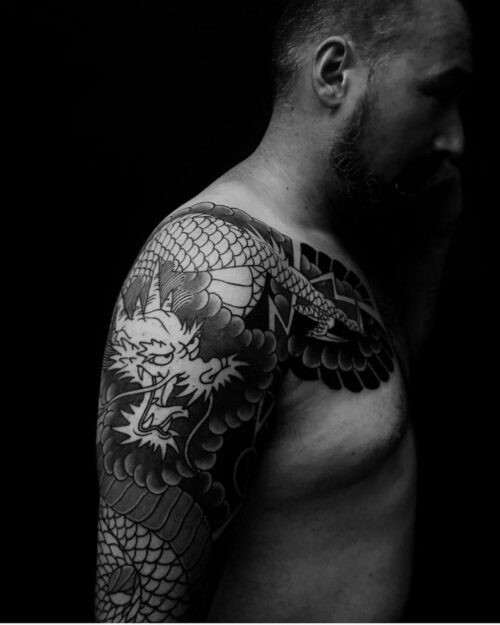 Intricate black and grey Japanese dragon tattoo on arm
Intricate black and grey Japanese dragon tattoo on arm
2. Traditional Japanese Tattoo
Traditional Japanese tattoos are distinguished by their unique aesthetic and storytelling approach. A key element is gakubori, the background that typically features waves or clouds, creating a dynamic setting for the central subject. This background not only enhances the visual impact but also adds depth and context to the main image, often a mythological figure or scene. This style reflects centuries of artistic tradition, where tattoos were narrative canvases telling tales of legends and moral lessons.
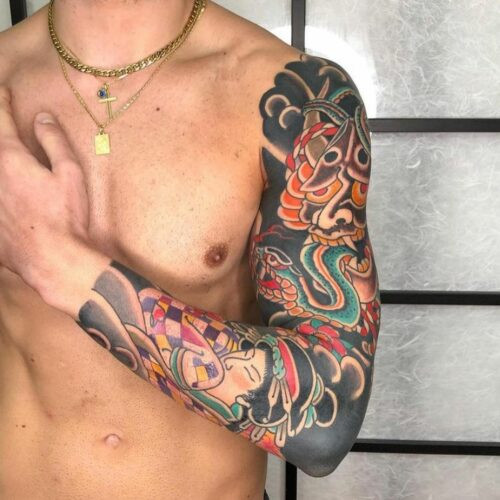 Full back traditional Japanese tattoo with vibrant colors depicting a warrior and mythical creatures
Full back traditional Japanese tattoo with vibrant colors depicting a warrior and mythical creatures
3. Japanese Cherry Blossom Tattoo
The cherry blossom, or sakura, holds a poignant place in Japanese culture and tattoo art. Symbolizing the ephemeral nature of life, cherry blossoms bloom vibrantly for a short period before their petals fall and are carried away by the wind. For men, a Japanese cherry blossom tattoo serves as a reminder of life’s fleeting beauty, the acceptance of impermanence, and the appreciation of each moment. It’s a subtle yet powerful symbol of life’s cycle.
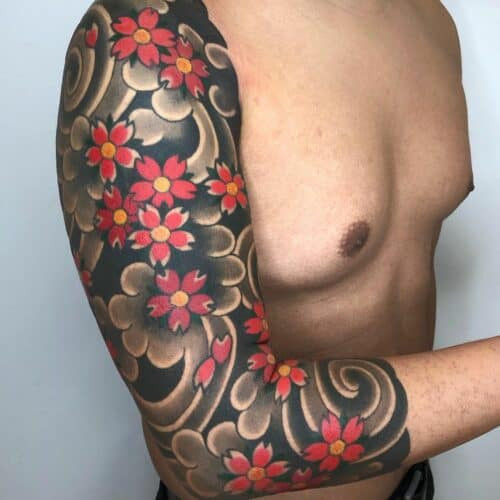 Delicate Japanese cherry blossom tattoo in pink and grey on forearm
Delicate Japanese cherry blossom tattoo in pink and grey on forearm
4. Japanese Tiger Tattoo
In Japanese culture, the tiger (tora) is revered as a symbol of courage, strength, and vitality. Unlike some Western interpretations, Japanese tiger tattoos also represent longevity and protection against misfortune and evil spirits. Often depicted in fierce poses, these tattoos are chosen by men seeking to embody bravery, resilience, and a protective aura. The tiger’s stripes and powerful form lend themselves beautifully to the irezumi style.
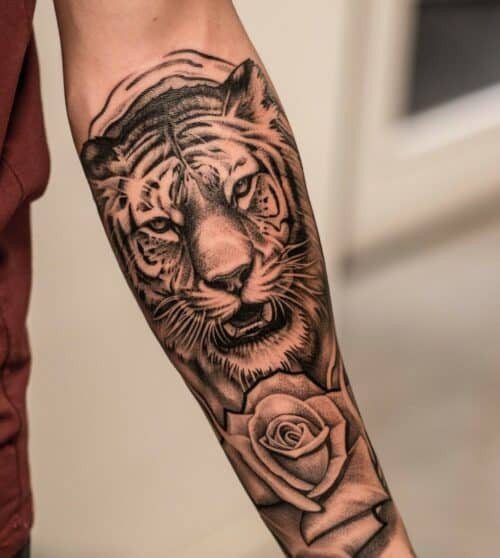 Bold Japanese tiger tattoo in black and orange with traditional wave background
Bold Japanese tiger tattoo in black and orange with traditional wave background
5. Japanese Flower Tattoo
Flowers in irezumi are rich with symbolism, extending beyond mere beauty. While each flower possesses unique meanings, Japanese flower tattoos generally represent the cycle of life, death, and rebirth. Common floral motifs include chrysanthemums (longevity, rejuvenation), peonies (wealth, good fortune, masculinity), and lotuses (purity, enlightenment). Men may choose flower tattoos not just for aesthetic appeal but for the profound messages they convey about life’s journey.
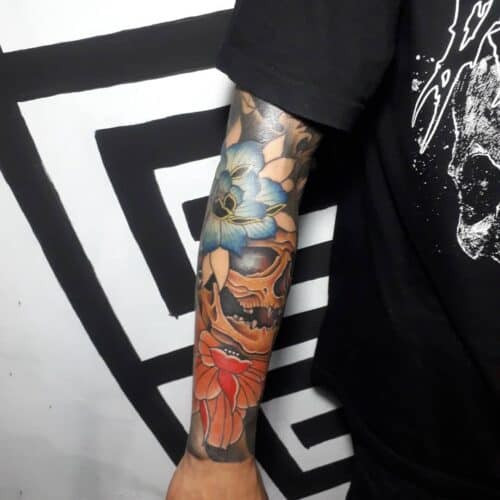 Vibrant Japanese flower tattoo featuring peonies and chrysanthemums with detailed leaves
Vibrant Japanese flower tattoo featuring peonies and chrysanthemums with detailed leaves
6. Japanese Koi Fish Tattoo
The koi fish is a quintessential element in irezumi, deeply embedded in Japanese symbolism. Representing perseverance, courage, and strength of character, the koi’s journey upstream, often against strong currents, embodies overcoming adversity. The color of Japanese koi fish tattoos further enriches their meaning, with gold koi symbolizing prosperity, red for love and strength, and black for overcoming challenges. For men, a koi tattoo is a potent symbol of ambition, resilience, and good fortune.
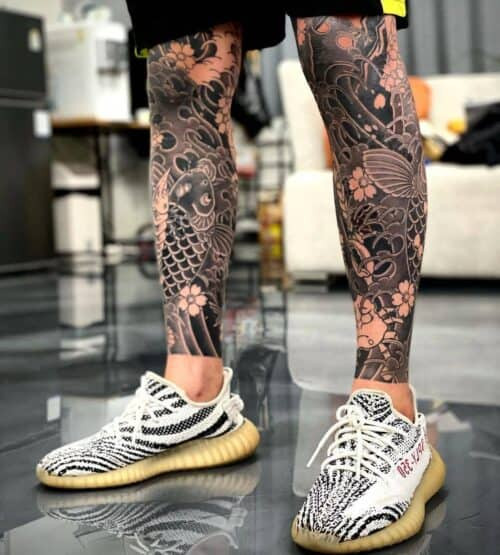 Colorful Japanese koi fish tattoo swimming upwards in a water current
Colorful Japanese koi fish tattoo swimming upwards in a water current
7. Japanese Snake Tattoo
Snakes (hebi) in Japanese culture, much like dragons, are revered rather than feared. Symbolizing wisdom, protection, and good fortune, they are also associated with healing and medicine. Japanese snake tattoos, with their intricate scales and sinuous forms, are visually striking and deeply symbolic. For men, a snake tattoo can represent transformation, protection from illness, and a connection to the earth’s wisdom.
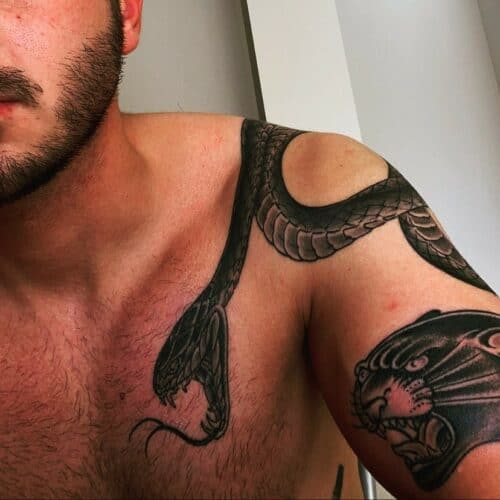 Detailed Japanese snake tattoo coiled around an arm with floral accents
Detailed Japanese snake tattoo coiled around an arm with floral accents
8. Japanese Wave Tattoo
The iconic “Great Wave off Kanagawa” by Hokusai exemplifies the symbolic power of waves in Japanese art. In irezumi, Japanese wave tattoos represent the constant flux of life, the ebb and flow of experiences, and the necessity of adaptability. They can also symbolize strength in the face of adversity, as waves are both powerful and relentless. For men, a wave tattoo can signify resilience, the acceptance of change, and a connection to the natural world.
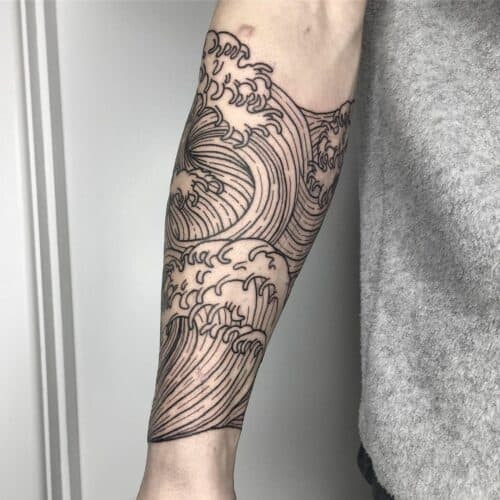 Japanese wave tattoo in traditional style with swirling blue and white water
Japanese wave tattoo in traditional style with swirling blue and white water
9. Japanese Demon Tattoo
Demons, or oni, in Japanese folklore are complex figures, often depicted with horns and fierce expressions. While traditionally associated with negativity, in irezumi, Japanese demon tattoos are believed to ward off evil spirits and bad luck, acting as protective talismans. For men, an oni tattoo can represent strength in overcoming inner demons, protection from external harm, and a rebellious spirit.
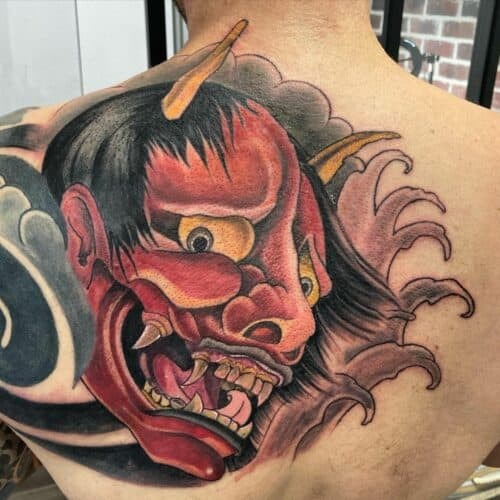 Japanese demon tattoo with a fierce oni mask in red and black
Japanese demon tattoo with a fierce oni mask in red and black
10. Japanese Samurai Tattoo
Samurai, the elite warrior class of Japan, embody virtues of courage, honor, loyalty, and discipline. Japanese samurai tattoos are powerful symbols of these noble traits. Depictions often include samurai in battle armor, wielding swords, or in stoic poses, representing bravery, respect, and unwavering commitment to their ideals. For men, a samurai tattoo is a tribute to these virtues and a personal aspiration to embody them.
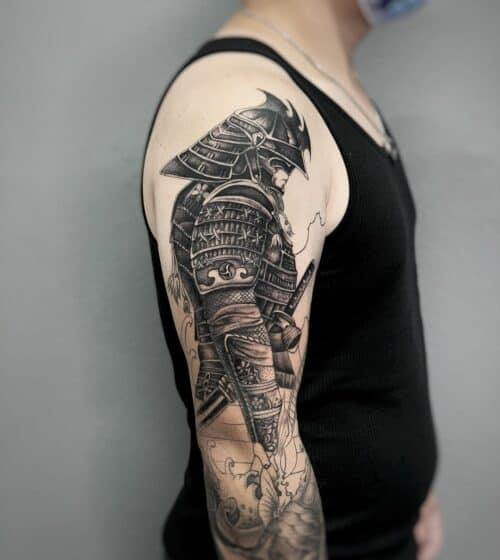 Japanese samurai tattoo in full armor with a katana sword on back
Japanese samurai tattoo in full armor with a katana sword on back
11. Japanese Cloud Tattoo
Japanese cloud tattoos, often used as gakubori, or backgrounds, in larger compositions, represent the heavens and the celestial realm. They provide a mystical backdrop for mythical creatures, deities, and narrative scenes in irezumi. Beyond their background function, clouds themselves can symbolize transition, change, and the dwelling place of gods and spirits. For men, a cloud tattoo can represent a connection to the spiritual or ethereal, and the transient nature of life.
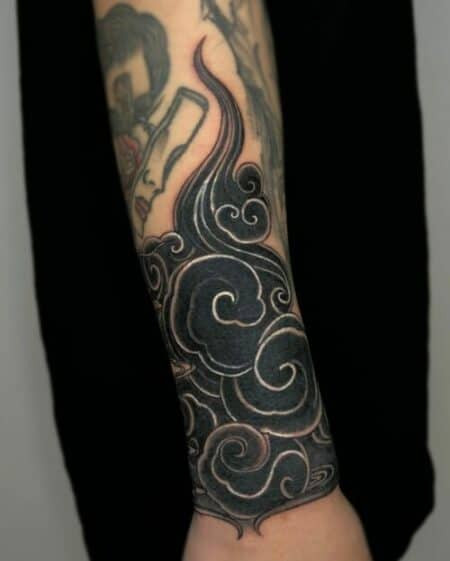 Japanese cloud tattoo in swirling grey and white as a background element
Japanese cloud tattoo in swirling grey and white as a background element
12. Japanese Peony Tattoo
The peony, known as the “King of Flowers” (botan) in Japan, is a symbol of wealth, prosperity, and good fortune. Japanese peony tattoos, with their lush, layered petals and vibrant colors, also represent masculine energy, boldness, and a devil-may-care attitude. For men, a peony tattoo combines elegance with a touch of audaciousness, signifying success and a flourishing life.
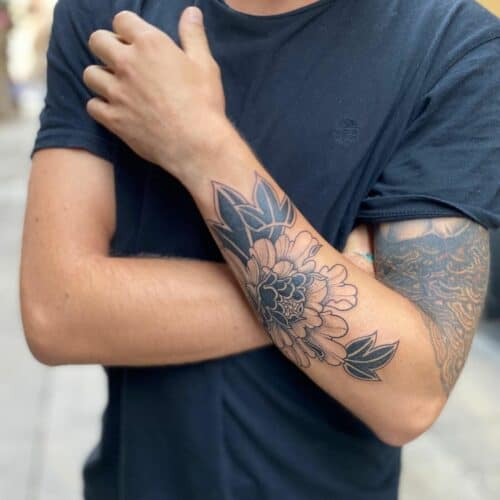 Detailed Japanese peony tattoo in pink and purple with flowing lines
Detailed Japanese peony tattoo in pink and purple with flowing lines
13. Traditional Japanese Dragon Tattoo
Traditional Japanese dragon tattoos emphasize the benevolent nature of dragons in Eastern lore. Unlike Western dragons often associated with greed and destruction, Japanese dragons are seen as guardians and bringers of good fortune. A traditional Japanese dragon tattoo is a powerful symbol of luck, wisdom, generosity, and striving for goodness. It reflects a desire to embody the dragon’s positive attributes.
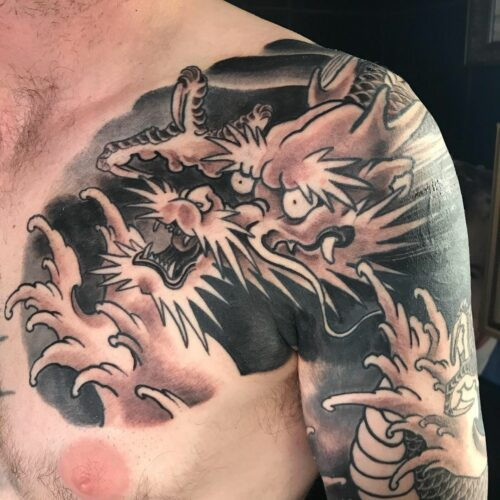 Classic traditional Japanese dragon tattoo in black and red with detailed scales
Classic traditional Japanese dragon tattoo in black and red with detailed scales
14. Japanese Crane Tattoo
Cranes (tsuru) are revered in Japanese folklore as holy animals, associated with longevity, happiness, and good fortune, often fabled to live for a thousand years. Japanese crane tattoos are potent symbols of long life, prosperity, and marital fidelity, as cranes are known to mate for life. For men, a crane tattoo can represent a wish for a long and prosperous life, fidelity, and good luck.
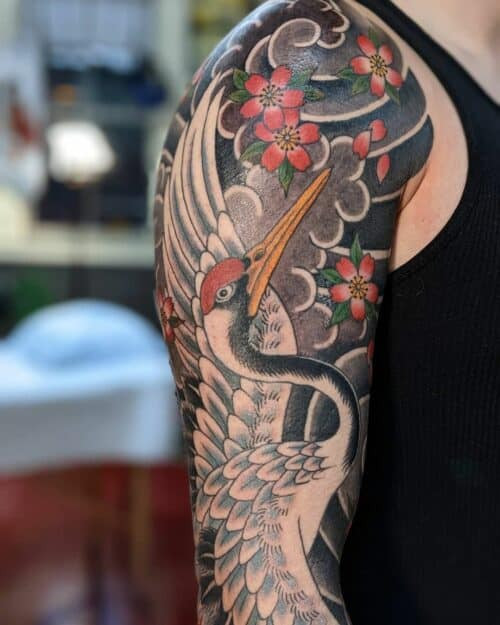 Elegant Japanese crane tattoo in flight with detailed feathers
Elegant Japanese crane tattoo in flight with detailed feathers
15. Japanese Oni Tattoo
Japanese Oni tattoos depict demons (oni) known for their horns and fierce expressions. In irezumi, they serve a paradoxical purpose: protection from evil spirits and misfortune. Japanese oni tattoos are chosen by men seeking to ward off negativity and embrace a form of spiritual protection. They are often rendered in bold colors and dynamic poses to maximize their visual impact and symbolic power.
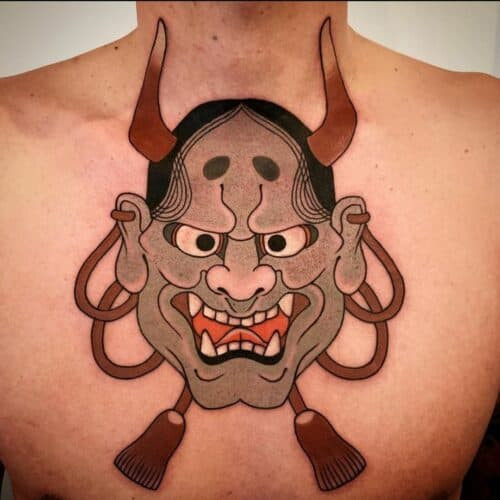 Japanese oni tattoo mask with prominent horns and sharp teeth
Japanese oni tattoo mask with prominent horns and sharp teeth
16. Japanese Temple Tattoo
Japanese temple tattoos, depicting Buddhist temples, are more literal representations of faith and devotion. These sacred sites are places of worship and prayer, and a temple tattoo signifies the wearer’s commitment to a pious and spiritual life. For men, a temple tattoo can represent inner peace, spiritual seeking, and dedication to Buddhist principles.
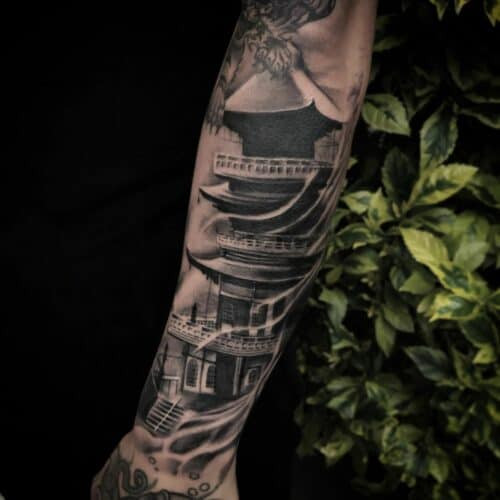 Japanese temple tattoo with intricate architecture and peaceful setting
Japanese temple tattoo with intricate architecture and peaceful setting
17. Japanese Water Tattoo
Water in irezumi, similar to clouds, often serves as gakubori, creating a flowing backdrop for other motifs like dragons, koi, and mythical creatures. Japanese water tattoos symbolize the constant flow of life, adaptability, and the interconnectedness of all things. Water’s fluidity and power make it a compelling element in Japanese tattoo art.
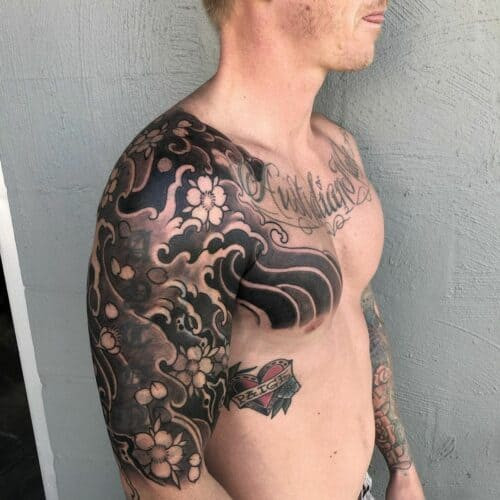 Japanese water tattoo with swirling currents and dynamic movement
Japanese water tattoo with swirling currents and dynamic movement
18. Japanese Frog Tattoo
Frogs (kaeru) are considered lucky in Japan, associated with good fortune and safe returns. The Japanese word for frog, kaeru, is homophonous with the word for “return,” making them symbols of safe travels and bringing back prosperity. Japanese frog tattoos often feature gold coins, further emphasizing their association with wealth and good luck. For men, a frog tattoo can represent a wish for good fortune, safe journeys, and prosperity.
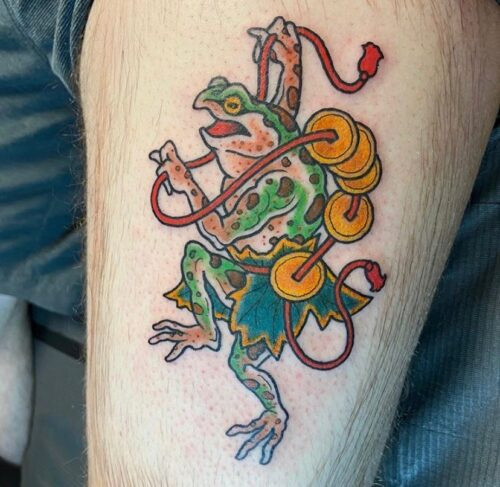 Japanese frog tattoo with a golden coin and lotus flower
Japanese frog tattoo with a golden coin and lotus flower
19. Japanese Foo Dog Tattoo
Foo dogs, or guardian lions (shishi or komainu), are mythical protectors found throughout Asia, often placed at entrances of temples and homes to ward off evil. Japanese foo dog tattoos embody this protective symbolism, believed to shield the wearer from bad luck, evil spirits, and misfortune. For men, a foo dog tattoo represents strength, guardianship, and a powerful protective aura.
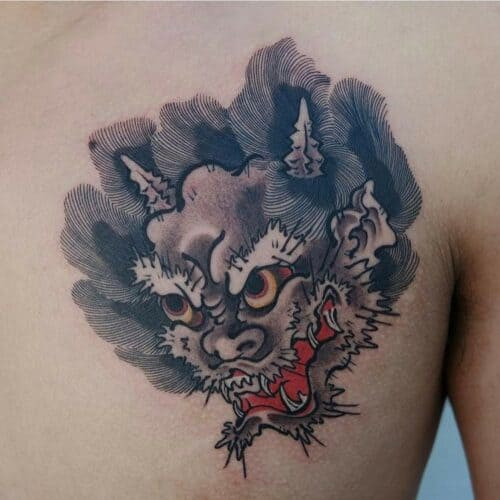 Japanese foo dog tattoo in a fierce stance with detailed fur
Japanese foo dog tattoo in a fierce stance with detailed fur
20. Japanese Octopus Tattoo
Octopus tattoos are less common in irezumi but carry unique symbolism rooted in Japanese folklore, particularly the legend of Akkorokamui, a giant, powerful octopus deity. Japanese octopus tattoos can represent intelligence, adaptability, and a wild, untamed nature. For men, an octopus tattoo might signify a complex personality, resourcefulness, and a connection to the mysteries of the deep sea.
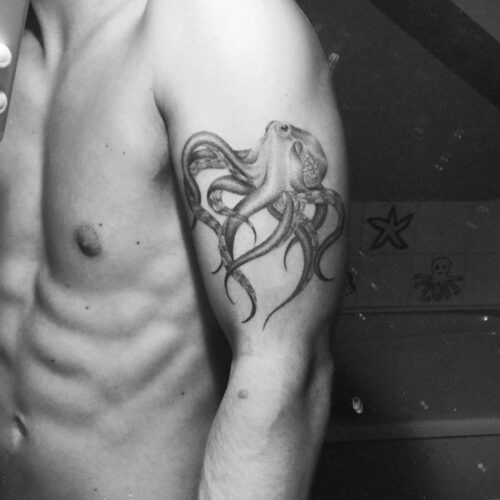 Japanese octopus tattoo with swirling tentacles and detailed suckers
Japanese octopus tattoo with swirling tentacles and detailed suckers
21. Japanese Wolf Tattoo
In Shinto religion, wolves (ookami) are considered sacred messengers of the gods, bridging the gap between the earthly and heavenly realms. Japanese wolf tattoos embody respect, loyalty, and a connection to divine powers. For men, a wolf tattoo can symbolize loyalty to family and pack, respect for nature, and a spiritual connection.
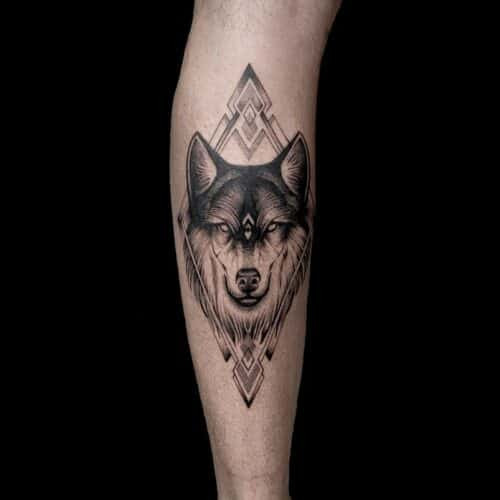 Japanese wolf tattoo howling with moon and forest background
Japanese wolf tattoo howling with moon and forest background
22. Japanese Mask Tattoo
Japanese mask tattoos draw inspiration from Noh theater, a classical Japanese dance-drama form. Masks like the Hannya mask, representing a woman consumed by jealousy and rage, are common motifs in irezumi. While masks have specific character meanings, Japanese mask tattoos are often appreciated as art forms themselves, representing complex emotions and dramatic narratives. For men, a mask tattoo can symbolize hidden emotions, inner turmoil, or an appreciation for Japanese theatrical arts.
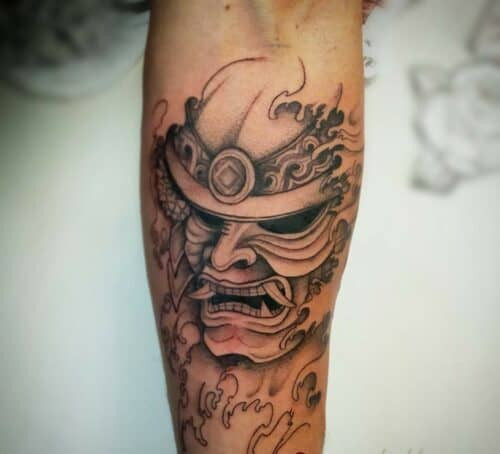 Japanese mask tattoo of a Hannya mask with fierce expression
Japanese mask tattoo of a Hannya mask with fierce expression
23. Japanese Cat Tattoo
While not as prevalent as other animals, cats in Japanese tattoos often depict maneki neko, the beckoning cat. This charming figure is a symbol of good luck and fortune, often seen in businesses and homes to attract prosperity. Japanese cat tattoos, particularly maneki neko, represent good luck, wealth, and positive energy. For men, a cat tattoo can be a playful symbol of fortune and attracting good things into life.
 Japanese cat tattoo of a Maneki Neko beckoning with paw raised
Japanese cat tattoo of a Maneki Neko beckoning with paw raised
24. Japanese Alphabet Tattoo
Japanese alphabet tattoos, like any script tattoo, derive meaning from the words they spell out. However, caution is advised to ensure accuracy, as misinterpretations can lead to unintended meanings. Japanese alphabet tattoos can range from single kanji characters carrying profound meanings to phrases or names. For men, these tattoos offer a personal and direct way to express beliefs, names, or meaningful words in Japanese script.
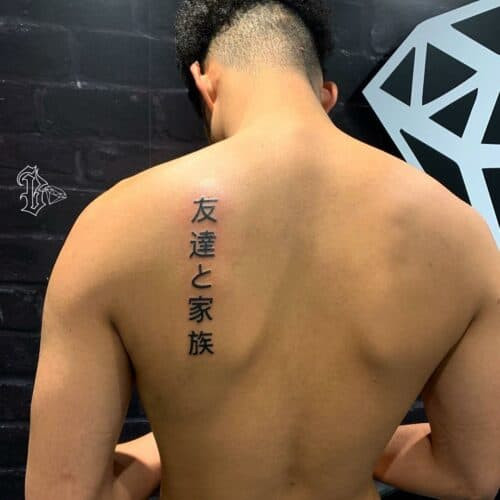 Japanese symbol tattoo featuring kanji characters in brushstroke style
Japanese symbol tattoo featuring kanji characters in brushstroke style
25. Japanese Yakuza Tattoo
Japanese Yakuza tattoos refer to traditional irezumi styles and themes that became associated with the Yakuza, Japanese organized crime syndicates, during the Meiji period when tattoos were outlawed. These elaborate designs, depicting myths and folklore, became a symbol of Yakuza identity. While tattoos are no longer illegal in Japan, Yakuza tattoos still carry social connotations. For men, choosing a “Yakuza tattoo” is essentially choosing traditional irezumi, appreciating its artistry and historical depth, while being aware of potential cultural perceptions in Japan.
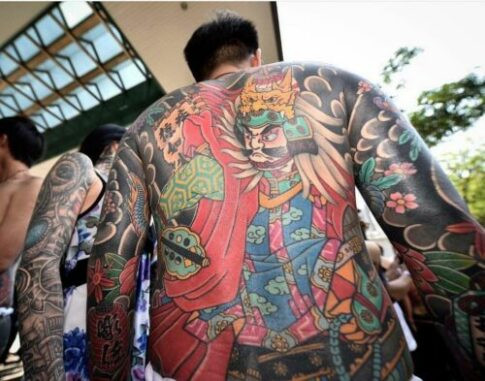 Japanese yakuza tattoo featuring a dragon and waves in a full body suit style
Japanese yakuza tattoo featuring a dragon and waves in a full body suit style
26. Japanese Art Tattoo
Japanese art tattoos encompass a broad spectrum, extending beyond traditional irezumi to include script, symbols, and contemporary styles like anime characters. This category celebrates Japanese artistic expression in its diverse forms. For men, Japanese art tattoos can range from classic motifs to modern pop culture references, reflecting individual tastes and appreciation for Japanese aesthetics.
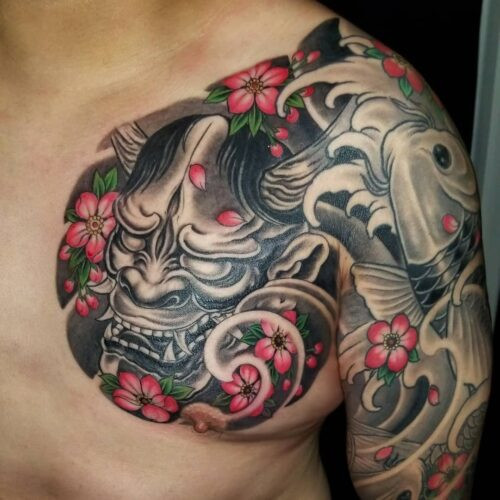 Japanese art tattoo featuring anime-inspired characters and vibrant colors
Japanese art tattoo featuring anime-inspired characters and vibrant colors
27. Japanese Lotus Tattoo
The lotus (hasu) holds deep spiritual significance across Asia, particularly in Buddhism. Rising from muddy waters to bloom into a pristine flower, the lotus symbolizes purity, enlightenment, and spiritual awakening. Japanese lotus tattoos often represent life’s journey, overcoming adversity, and achieving spiritual growth. For men, a lotus tattoo can signify resilience, spiritual aspiration, and inner peace.
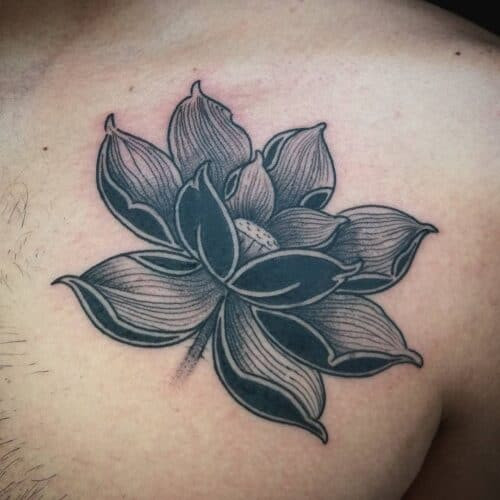 Japanese lotus tattoo in full bloom with detailed petals and leaves
Japanese lotus tattoo in full bloom with detailed petals and leaves
28. Japanese Sun Tattoo
Japan, known as the “Land of the Rising Sun,” features the sun prominently in its national flag. Japanese sun tattoos, often depicted as a red disc, represent a love for Japanese culture and heritage, rather than deep mythological symbolism. For men, a sun tattoo can be a symbol of national pride, appreciation for Japanese aesthetics, or a representation of new beginnings and energy.
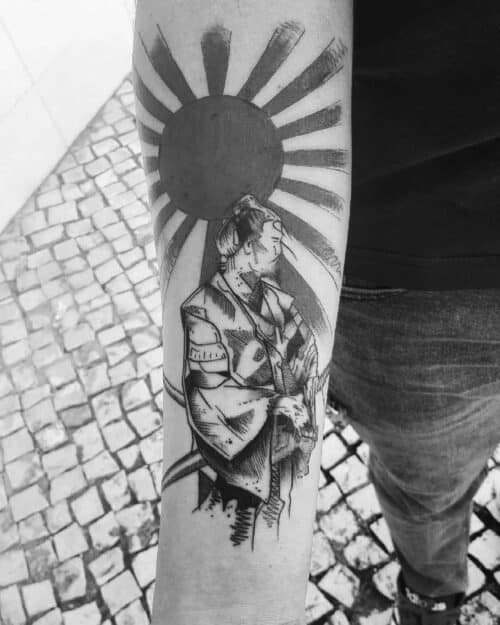 Japanese sun tattoo in solid red disc with radiating lines
Japanese sun tattoo in solid red disc with radiating lines
29. Japanese Sleeve Tattoo
Japanese sleeve tattoos, known as nagasode (full sleeve) and varying lengths, are defined by their coverage area. Full sleeves (nagasode) typically extend from the chest, over the shoulder, and down the arm, often stopping at the wrist (kubu) or just above the hand (tobu). These expansive tattoos allow for intricate storytelling and detailed compositions. For men, sleeve tattoos are a bold commitment to the irezumi style, showcasing elaborate designs and personal narratives.
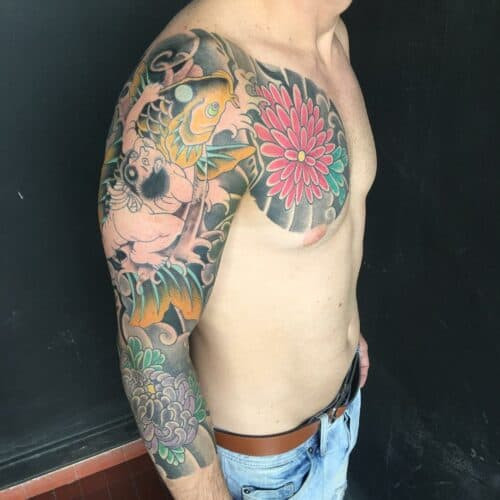 Japanese sleeve tattoo featuring dragons, waves, and floral elements
Japanese sleeve tattoo featuring dragons, waves, and floral elements
30. Japanese Back Tattoo
Japanese back tattoos, or kame-no-kou (senaka), are large-scale masterpieces, often depicting a single, breathtaking scene across the entire back. Their size allows for incredible detail and complexity, making them some of the most impressive forms of irezumi. The term kame-no-kou, meaning “tortoise shell,” refers to the tattoo’s coverage area extending to the buttocks and upper thighs. For men, back tattoos are the ultimate canvas for expressing grand narratives and showcasing the pinnacle of irezumi artistry.
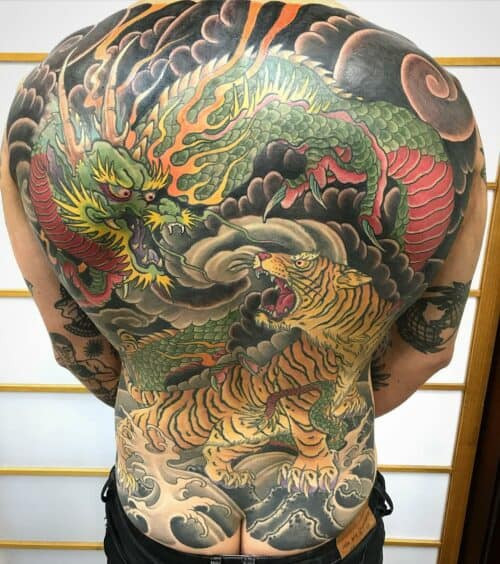 Japanese back tattoo depicting a mythical battle scene with vibrant colors
Japanese back tattoo depicting a mythical battle scene with vibrant colors
31. Japanese Chest Tattoo
Japanese chest tattoos, known as hikae, come in two main styles: deep hikae, extending over the chest and around the nipples, and shallow hikae, stopping at the shoulders. These tattoos often complement sleeve designs, creating a cohesive bodysuit effect. For men, chest tattoos can be a powerful extension of sleeve designs, adding to the overall visual impact and narrative of their irezumi.
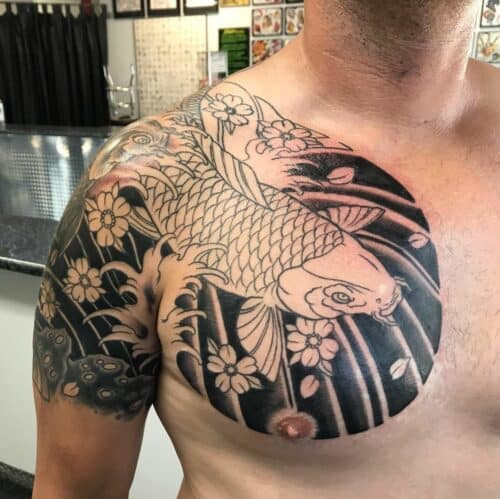 Japanese chest tattoo featuring a dragon and clouds extending from the shoulder
Japanese chest tattoo featuring a dragon and clouds extending from the shoulder
32. Japanese Forearm Tattoo
Japanese forearm tattoos are often part of sleeve designs, with varying lengths like shichibusode (seven-tenth sleeve, ending below the elbow) and gobusode (five-tenth sleeve, ending above the elbow). These lengths offer flexibility in design and coverage. For men, forearm tattoos are versatile, allowing for standalone pieces or integration into larger sleeve compositions, showcasing dynamic irezumi art on a readily visible area.
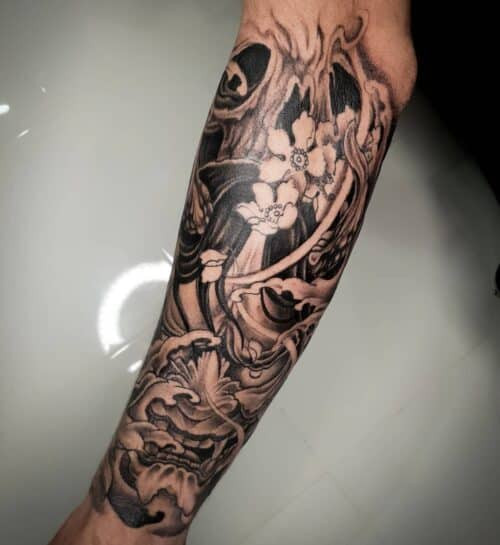 Japanese forearm tattoo with koi fish and water waves in blue and grey
Japanese forearm tattoo with koi fish and water waves in blue and grey
33. Japanese Hand Tattoo
Japanese hand tattoos represent a modern evolution of irezumi, as traditional styles typically avoided areas exposed by clothing. Modern artists now apply the same intricate designs to hands, featuring motifs like hannya masks, oni, and samurai. For men, hand tattoos are a bold and contemporary expression of irezumi, showcasing detailed Japanese art in a prominent location.
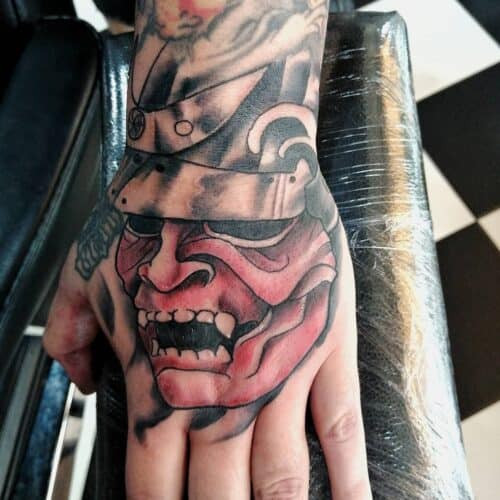 Japanese hand tattoo featuring a samurai warrior with helmet and sword
Japanese hand tattoo featuring a samurai warrior with helmet and sword
34. Japanese Neck Tattoo
Japanese neck tattoos, like hand tattoos, are a modern adaptation of irezumi, extending the art form to previously less-tattooed areas. Popular motifs for neck tattoos include dragons, oni, and koi, mirroring traditional irezumi themes in a contemporary placement. For men, neck tattoos are a striking and visible statement, showcasing Japanese designs in a unique and modern way.
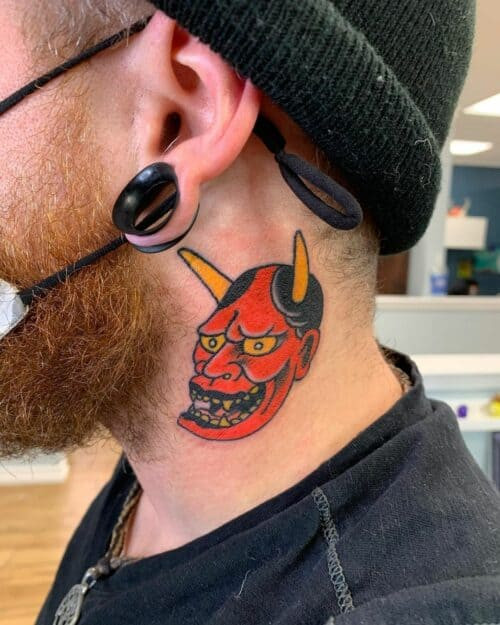 Japanese neck tattoo featuring a dragon head and flowing lines
Japanese neck tattoo featuring a dragon head and flowing lines
35. Japanese Leg Tattoo
Japanese leg tattoos, traditionally part of full body suits (soushinbori), are now popular as standalone pieces. Starting from the hip, thigh, or knee, legs offer ample space for expansive Japanese tattoo designs. For men, leg tattoos provide a large canvas for detailed irezumi art, whether as part of a full body suit or as individual, impactful pieces.
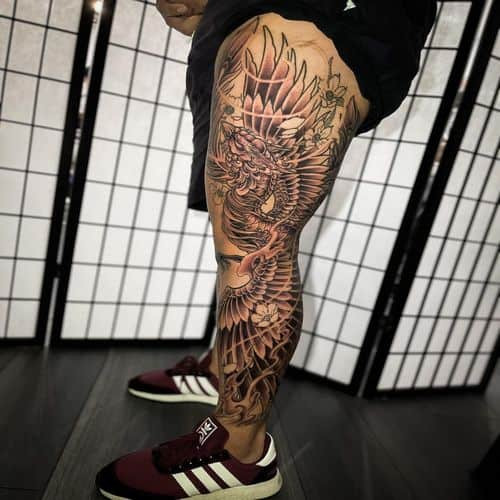 Japanese leg tattoo featuring a dragon, waves, and cherry blossoms
Japanese leg tattoo featuring a dragon, waves, and cherry blossoms
FAQs About Japanese Tattoos
What is a traditional Japanese tattoo called?
Traditional Japanese tattoos are known as irezumi, a term that encompasses the rich history and artistry of this tattoo style, dating back centuries.
How long does a traditional Japanese tattoo take?
The duration to complete a Japanese tattoo depends significantly on the size and complexity of the design. Traditionally, irezumi was done by hand using bamboo tools. While some artists still practice this method, modern tattoo machines are more common. A full back piece, even with a machine, can take multiple sessions, each lasting several hours, to complete due to the intricate detail involved.
Is it okay to get a Japanese yakuza tattoo?
The term “yakuza tattoo” essentially refers to traditional irezumi designs. There is no inherent problem in getting a tattoo in this style, as it represents a significant and beautiful art form. However, it’s worth noting that in Japan, tattoos in general, including irezumi, can still be associated with negative perceptions, particularly in places like public pools and bathhouses where tattoos may need to be covered. Choosing irezumi is about appreciating the art form, but cultural sensitivity is advisable, especially when in Japan.
